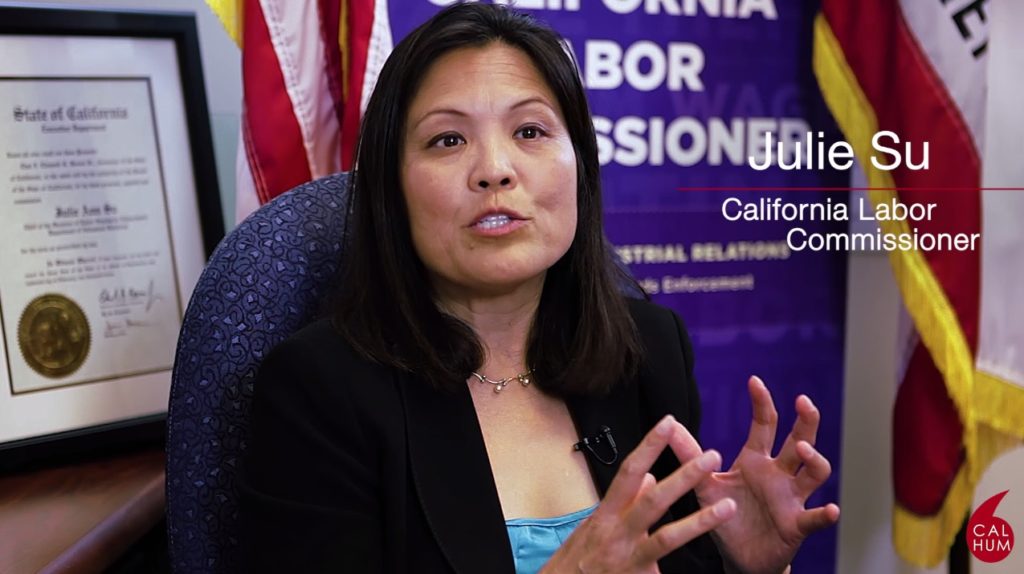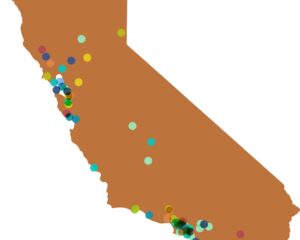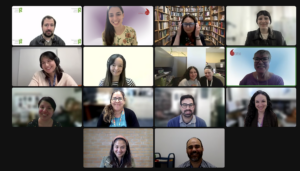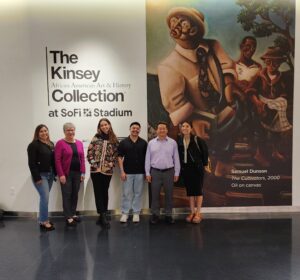Nationally recognized expert on workers’ rights and civil rights, Julie has dedicated her distinguished legal career to advancing justice on behalf of disenfranchised communities, and we’re so proud to have her join our board of directors. Julie also participated in our We Are the Humanities initiative, which we launched in 2015 to help us celebrate over 40 years of grantmaking, partnerships and public programming across the state. We asked a diverse group of prominent Californians how the humanities have helped shape their lives and created a series of over thirty short videos with their responses.
California Humanities: What experience of the humanities did you have in school growing up? Are your children experiencing more or less humanities-focused education – or is there a difference? How has an appreciation for the humanities intersected with your professional life – as a lawyer, as a human rights advocate, as Labor Commissioner?
Julie Su: When I was growing up, it was the humanities that drew me in at school. I was moved by the people I studied in history and literature, characters real and imagined, who suffered greatly and yet, in the face of exploitation, poverty, prejudice, fought to change things. Aspects of my life, including racism directed at me and my family and friends and the immigrant experience of my parents, were reinforced by the humanities I was exposed to in school, and I grappled with questions like, what makes some people give up, conform or just fit in and others fight? How do those with no voice speak up? What is the responsibility of those who do have a voice? How do we do what’s right, even when it’s hard, even when it’s unpopular? That exposure fueled my desire to pursue justice by becoming a civil rights attorney and a human rights advocate. My children are now growing up in the same community I grew up in. I do worry that the focus on standardized testing has made it harder to create an educational environment where the types of questions that fascinated me are nurtured and debated. The high school is also less racially diverse than it was when I grew up — the year I graduated from high school, my community was found to be the most ethnically diverse in the country, and that diversity had a profound effect on me; to me, it is a necessary component of a quality education and a quality life. My daughters love to perform in musical theater, and they are at a public high school that values the arts and this has given them an opportunity to perform and develop their passion for music and life and learn how to connect with people through a whole different medium for which I am very grateful.
CH: The things that the humanities engender, such as empathy, understanding, critical thinking, amplifying voices, generation and discussion of ideas, are important to a civil society. Why are those things important today? What are you looking forward to as a new California Humanities board member?
JS: These things are more important than ever because we live in a time where deep divisions in our society, made worse by incessant divisive rhetoric and policies, threaten the foundations of civil society. I think we are feeling that many of our institutions and the things that hold us together are fragile. Combine that with the fact that people can filter their information, their news, their very lives by hearing only things they agree with, only opinions that make them comfortable, and can begin to believe that their perspectives and experiences are the only ones of value. The humanities are a direct challenge to this. By telling stories of people, particularly those who have struggled, who have persevered, it becomes much harder to say, “That’s not real. That can’t be.” Or, “I don’t care.” I am very excited to work as a board member to support the incredible work California Humanities does to tell more stories, to support people who need to be heard, and to think about the many ways we can strengthen humanities education for young people so they will feel strong in telling their stories, too, and listening to the stories of others.
CH: What books are on your bedside table?
JS: The Invention of Wings by Sue Monk Kidd, The Book of Joy, about conversations between the Dalai Lama and Archbishop Desmond Tutu, and (I’m a little embarrassed to admit but I read it all the time), the California Labor Code, because I don’t think I can do my job without knowing it inside out.
You can watch Julie’s We Are the Humanities’ interview here.





